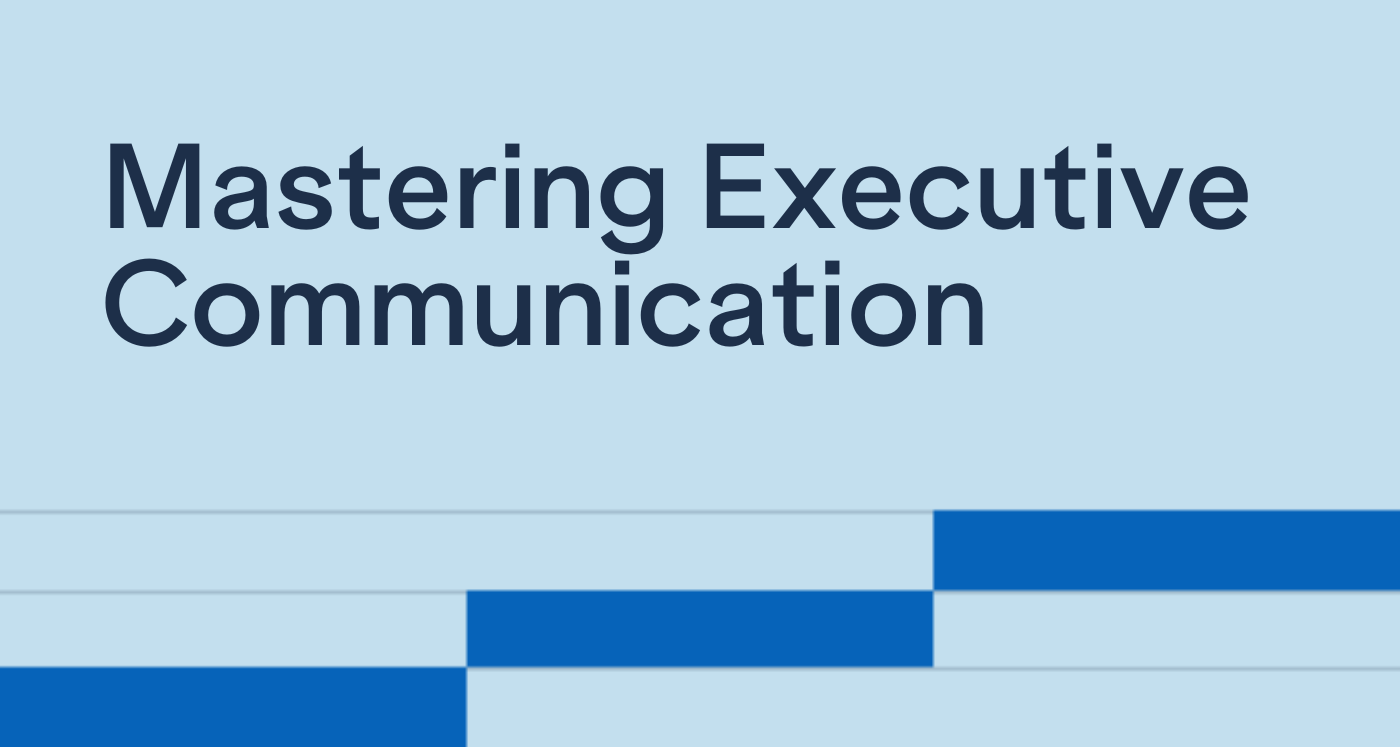
Mastering Executive Communication: Insights from David Calusdian on Effective Investor Relations
Effective investor relations extends far beyond crafting compelling messages. Learn how the experts deliver their story strategically.
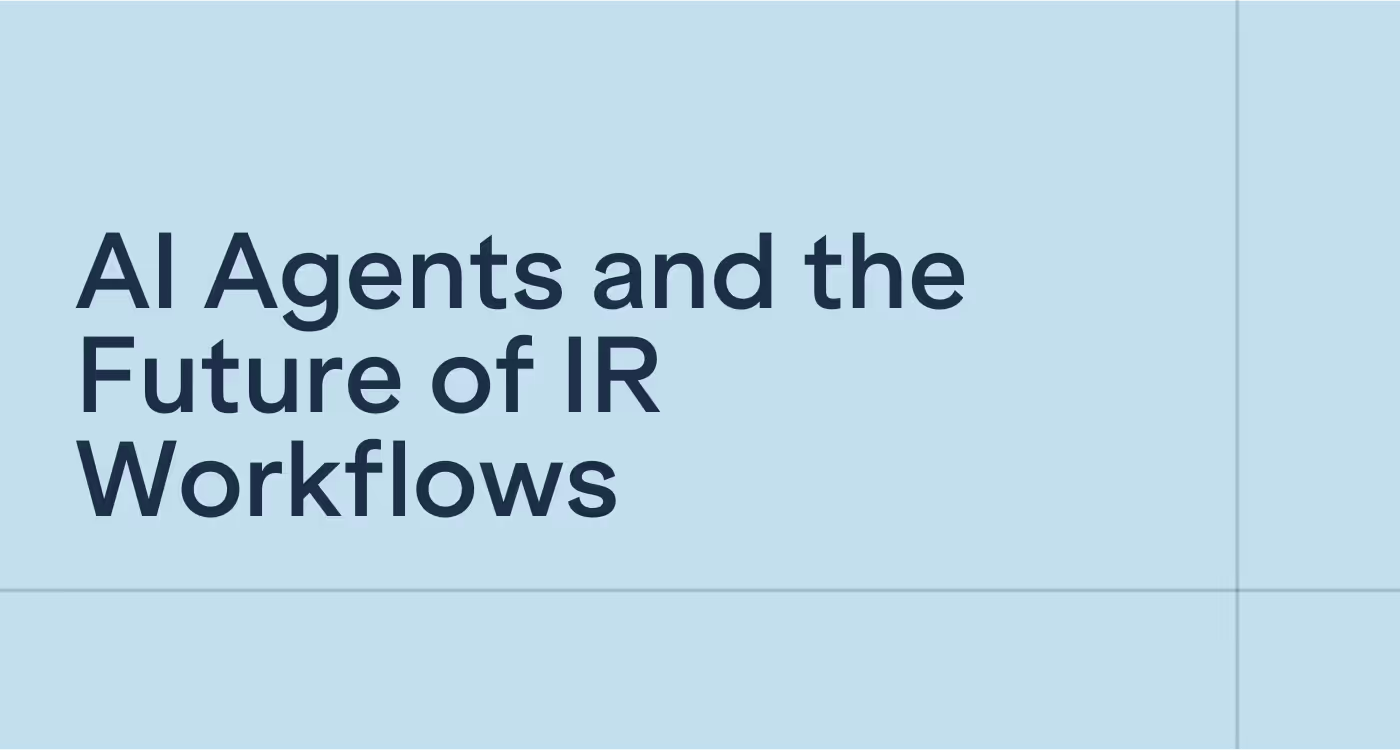
At NIRI Annual 2025, artificial intelligence dominated conversations—from panels to express talks to discussions with IROs about practical applications. This evolution reflects IR professionals’ mature, measured approach toward AI adoption, which makes sense given investor relations' unique position at the intersection of communication and capital markets.
AI Agents in Financial Services were valued at $490.2 million in 2024 and are projected to reach $4.49 billion by 2030. For investor relations, this growth represents unprecedented opportunities to eliminate administrative distractions and focus on what matters most—building relationships and driving strategic value.
Our own Mark Fasken, SVP and Co-Head of Irwin, and Tim Leahey, Director of Product Management for FactSet's Corporates Business Unit, hosted an express talk at NIRI this year, diving into the present and future of AI, agents, and what the IR workflow of the future looks like.
In our latest State of IR research, 64% of investor relations professionals indicated they have not embedded artificial intelligence into their processes, but are interested in understanding its potential. However, early adopters are already seeing significant benefits across core IR functions.
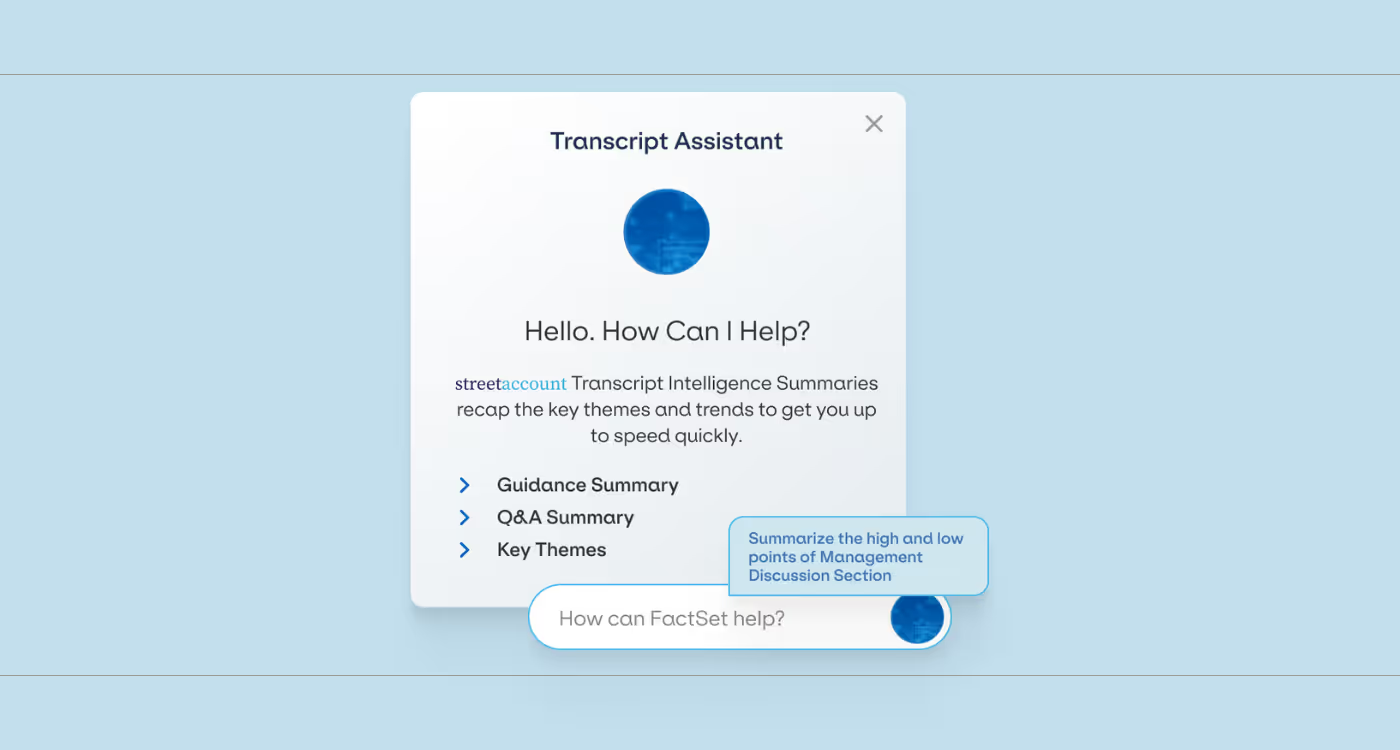
Transcript Analysis: AI-powered chatbots and tools like FactSet's Transcript Assistant can quickly analyze and summarize earnings calls and conference transcripts, identifying key themes and trends. FactSet’s Intelligent Platform enables natural language queries across high-value datasets, allowing IR teams to interact conversationally with complex financial information.
Intelligent Summarization: Based on our State of IR research, IROs have consistently identified summarization as providing the most valuable AI opportunity—transforming long-form reports, documents, and financial information into actionable insights. Irwin's AI Summaries exemplify this capability, automatically summarizing meeting and engagement notes within your CRM and providing relationship data summaries, key speaking points, and trends over time.
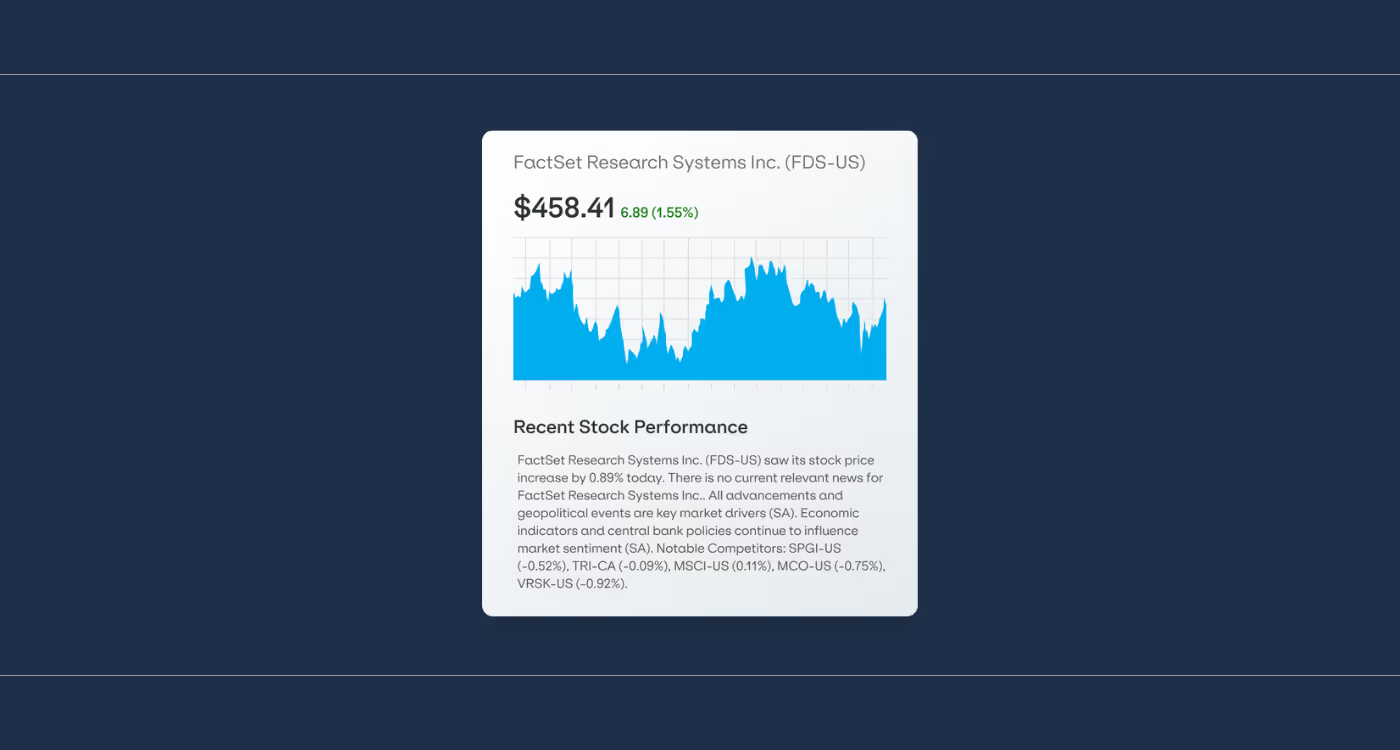
Market Intelligence: AI can assist with reviewing the company's latest financial statements to extract the most relevant data, such as revenue growth, profitability, expenses, capital expenditures, and cash flow. Tools like FactSet's AI-powered security explanation feature help IROs understand stock price movements, while automated chart construction and formatting capabilities streamline presentation preparation.
Earnings Preparation: AI streamlines the entire earnings cycle by automating the collection and analysis of financial data from internal and external sources. This represents a fundamental shift from manual, time-intensive processes to intelligent automation that frees IR teams for strategic work.
An artificial intelligence agent is software that can interact with its environment, collect data, and use that data to perform self-determined tasks to meet predetermined goals. Humans set goals, but an AI agent independently chooses the best actions to achieve those goals.
The distinction between today's AI tools and agents is crucial. Current AI models (often called Large Language Models or LLMs) require specific prompts to produce results. Agentic AI goes beyond GenAI by enabling autonomous decision-making, collaboration and learning.
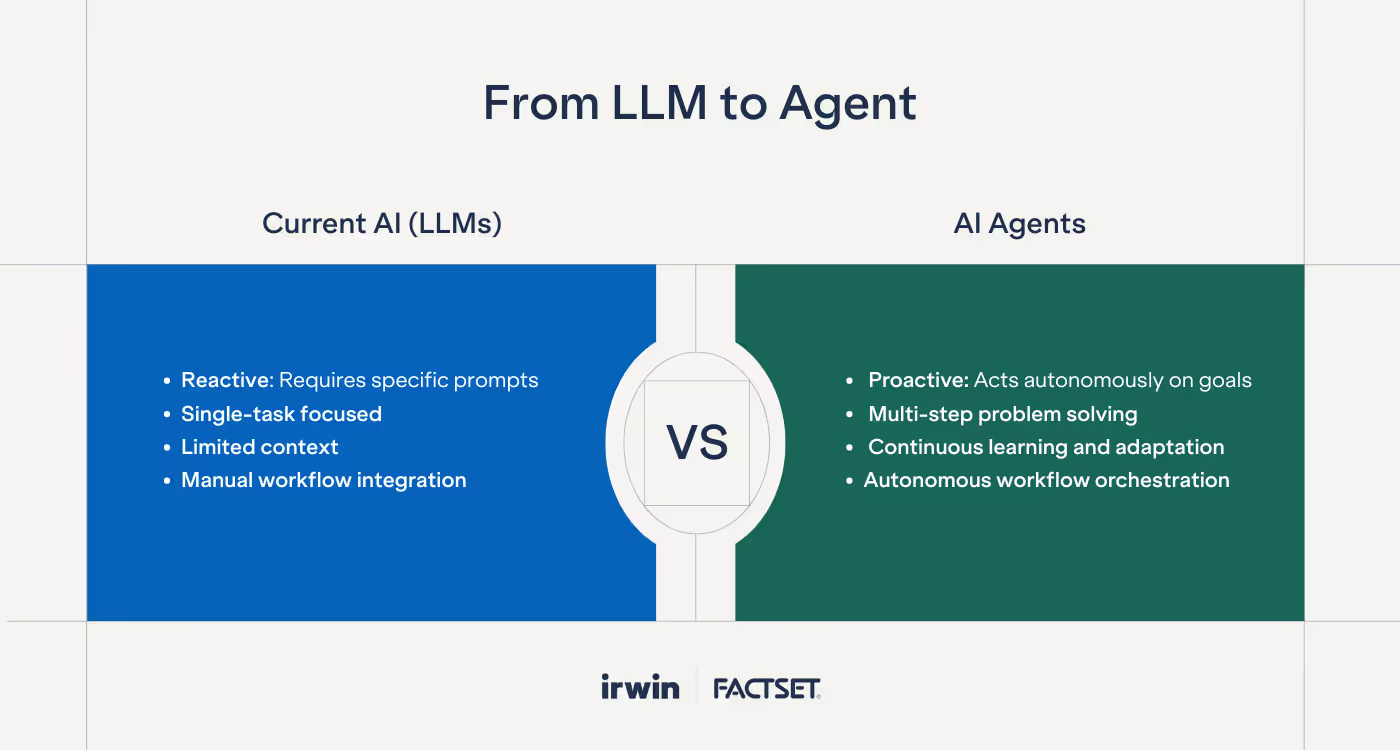
Agentic AI's increased autonomy enables it to handle repetitive, data-intensive processes. This gives financial institutions and market participants increased capability to optimize workflows, enhance compliance, and improve decision-making.
AI agents represent a fundamental shift in how IR teams operate, moving from manual, repetitive tasks to strategic, relationship-focused work. An AI agent can assume many responsibilities traditionally handled by an IR analyst:
Data Collection and Analysis: Automatically gathering and formatting information from multiple sources, generating charts, and creating investor-friendly summary drafts.
Meeting Preparation: Comprehensive briefing materials generated automatically, including relevant background data, recent developments, and strategic talking points.
Relationship Intelligence: Continuous monitoring of investor behavior, preferences, and interaction history to inform engagement strategies.
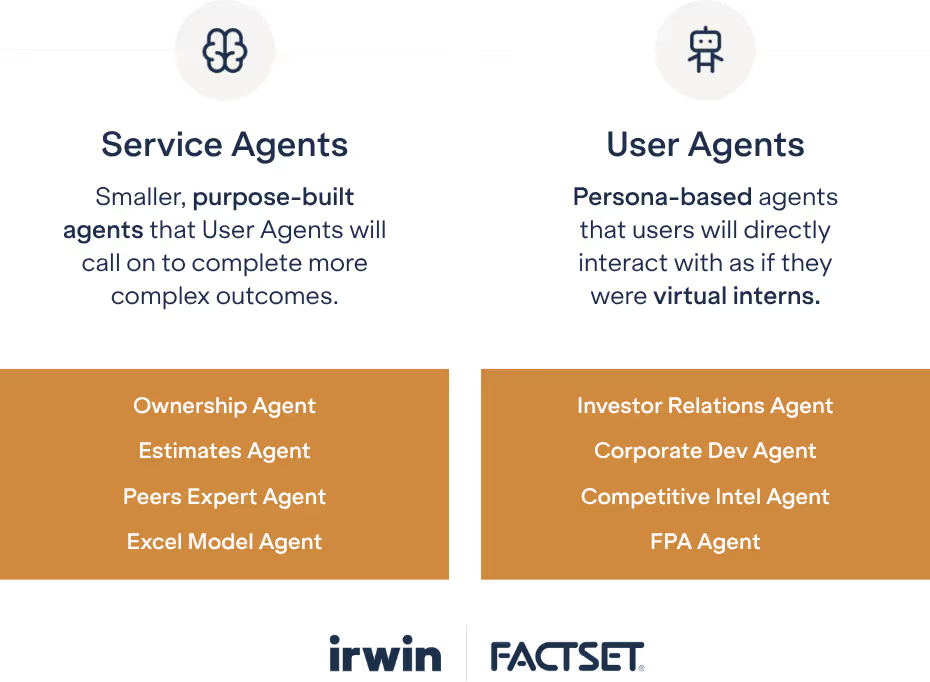
Smaller, purpose-built agents that serve specific functions within the broader IR ecosystem:
Persona-based agents that IR teams interact with directly, acting as virtual team members:
Earnings preparation continues to be a significant time drain for IR teams. This represents an ideal application for agentic workflows, where the combination of complexity and repetition makes automation both valuable and feasible.
Traditional earnings preparation involves manual compilation of financial data across multiple systems, time-intensive analysis of peer transcripts and messaging, labor-intensive Q&A preparation and scenario planning, and fragmented information synthesis across various sources.
FactSet Custom Workflows: IR teams can create, refine, and save a series of custom prompts that deliver precisely the information needed for earnings preparation. These workflows become reusable assets that improve with each earnings cycle.
Automated Data Aggregation: AI can assist in drafting the initial script or prepared remarks for the earnings call, ensuring that all critical data is covered in an organized and coherent manner.
Future earnings agents will aggregate relevant data into clean, digestible reports and synthesize information to identify anomalies and summarize potential implications. These comprehensive solutions will include:
The goal is transforming earnings preparation from a time-intensive manual process into an intelligent, automated workflow that produces higher-quality insights while freeing IR teams for strategic engagement.
As AI agents become more sophisticated, we can envision a future where they autonomously execute business processes, driving transformation across investor relations workflows.
The evolution of AI's natural language understanding is making human-machine interactions increasingly intuitive and flexible. This progression points toward a future where AI agents seamlessly integrate into IR workflows, handling complex, multi-step processes while maintaining the strategic oversight and relationship focus that defines excellent investor relations.
The shift toward agentic workflows represents more than technological advancement—it's an opportunity to fundamentally elevate the investor relations profession. By automating routine tasks and generating intelligent insights, AI agents free IR teams to focus on what they do best: building relationships, crafting compelling narratives, and driving strategic value.
At Irwin and FactSet, we're always thinking about solving problems IROs actually face—elements of their role that consume too much time and inevitably distract from strategic work that drives innovation and moves the capital markets forward.
Our development philosophy centers on practical solutions that enhance IR workflows rather than adding complexity. Whether it's Mercury's conversational interface for complex data queries or Irwin's AI Summaries for relationship intelligence, every solution is designed with the IR professional's daily reality in mind.
Our team remains committed to innovation that elevates the profession of investor relations. AI agents represent the next frontier in this mission—developing practical solutions that enhance IR workflows without adding distraction or complexity.
The question isn't whether AI agents will transform investor relations, but how quickly IR teams will embrace this transformation to gain competitive advantage. Those who act now—thoughtfully and strategically—will find themselves better positioned to thrive in an increasingly complex capital markets environment.
Contact our team to learn more about FactSet’s AI Solutions, Irwin's AI Summaries, and the full suite of intelligent solutions designed specifically for investor relations professionals.

Effective investor relations extends far beyond crafting compelling messages. Learn how the experts deliver their story strategically.
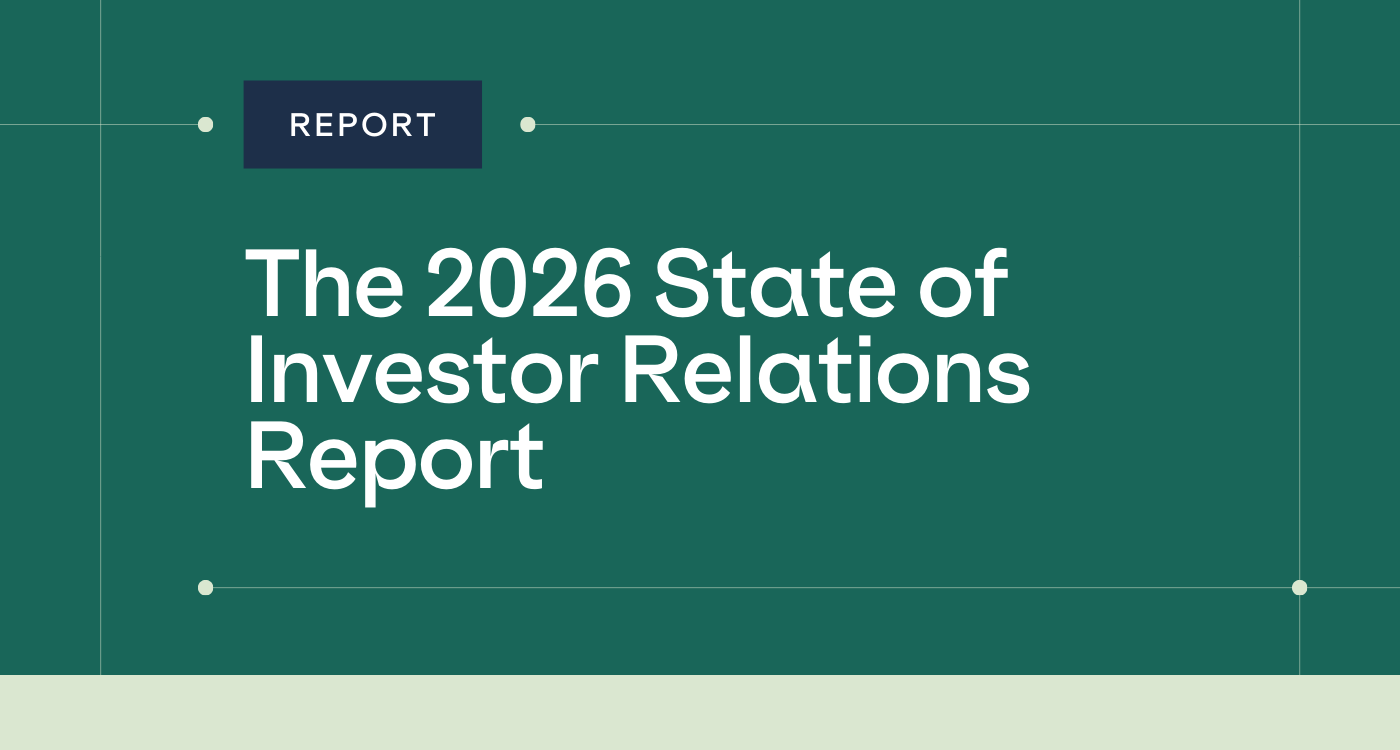
Across geographies and market caps, one theme is consistent: IR is entering a period of recalibration. Learn what's changing in 2026.

Learn how seasoned IR veterans are executing targeting strategies for small-mid-cap companies.